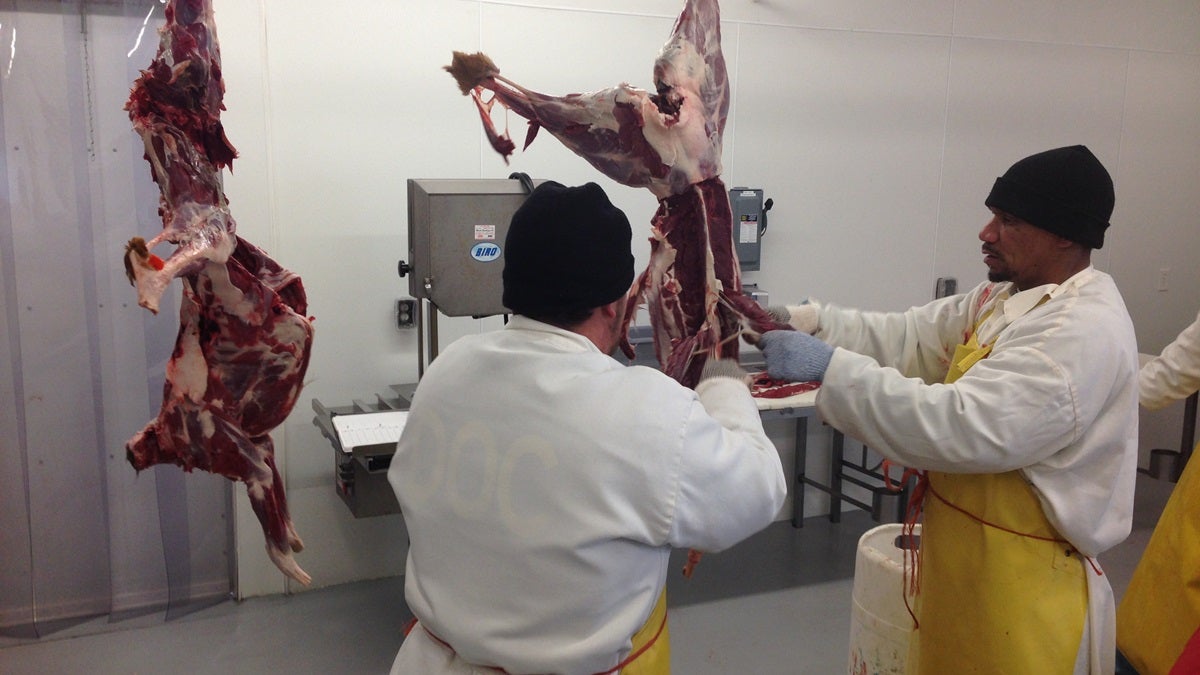Delaware prison job training aims to reduce recidivism [video]
Listen
Inmates in Georgetown butcher deer meat donated by hunters. (Mark Eichmann/WHYY)
From auto maintenance to butcher training, prisoners at one southern Delaware facility are learning all sorts of trades in hopes of landing a job after release.
A recent study examined how many Delaware inmates return to prison after being released and the numbers weren’t surprising. In 2009, 76 percent of prisoners were re-arrested within three years.
A program at the Sussex Community Corrections Center is looking to reduce that that high recidivism. Inmates being held at Level IV confinement in Georgetown work at the center while learning a marketable skill that will ideally lead to employment when they’re released.
Governor Markell announced plans to expand the program in last month’s State of the State. “We should also enable more offenders to develop their job skills and abilities while incarcerated,” Markell said in January. “As a young woman on the East Side of Wilmington recently told me: ‘The streets are always hiring.’ We can’t let the street be the only option.”
“We don’t want to see them again”
Chief Alan Grinstead heads up the Department of Correction’s Bureau of Community Corrections. Helping prisoners develop job skills is right in line with their mission. “We don’t want to see them again, no offense to those individuals. We would like them all to go on and become successful, law abiding, productive citizens,” Grinstead said.
The inmates work in a variety of fields on site at the Georgetown facility. They chop wood that will be sold for use by visitors in Delaware state parks. They process cans and cardboard from other state facilities for recycling. There’s even an automotive maintenance building where old State Police cruisers are decommissioned and other fleet vehicles are maintained.
“The department’s interested in public safety as well as rehabilitation, and they really take that to heart here,” Grinstead said. “The rehabilitation component comes alive here.”
The man in charge of all the programs at SCCC is Warden Bill Oettel who’s willing to consider any job training to put the inmates to work on. “There’s no bad idea,” Oettel said. “We’re involved in a lot of things here.”
Prison butcher shop
One of those things they’re involved in is a butcher shop run by inmates. Yes, inmates are given sharp knives to butcher deer that have been donated by hunters. The meat is ground into two-pound sections and donated to local food banks. There’s even jail house jerky.
“That was an idea that was brought to me quite a few years ago,” Oettel said. “I said, well, let’s look at it a little bit more.” The administration and DOC commissioner signed off on the plan and now, they consider the butcher program a success.
Work is underway on a new auto body and welding fabrication shop on site in Georgetown. The construction of the new building is being done by the prisoners who likely will work in the shop when it’s completed.
“Everything has to be self-supporting, none of the tax dollars are going back into this,” said Oettel. “All these programs and projects that we’re involved with are self-supporting and [also] teach the offenders a background and skill-set.”
Inspired by Matt Haley
One skill Governor Markell wants to expand training for is in the kitchen. He talked about it in January’s State of the State when he proposed expanding the culinary arts program at James T. Vaughn, a Level V prison in Smyrna.
“I’m reminded of the late restaurateur and philanthropist Matt Haley, who credited his culinary training in prison with turning his life around,” Markell said last month. “It’s appropriate that we name this initiative the Matt Haley Culinary Arts Program as a reminder that everyone has something to contribute when given the chance.
Haley, who died in an accident in India last fall, helped launch the culinary program for inmates in Georgetown, donating hundreds of dollars’ worth of kitchen supplies through his company, Sodel Concepts:
“He really assisted in that and made it easier on us to get it done and get it done quickly,” said Grinstead.
Haley’s donation included stainless steel cookware, chafer pots, utensils, knives, cookbooks and many other items.
Inmates who go through the culinary program in Georgetown get a foot in the door with an employer. Sgt. Sandy Dale works with inmates in the culinary program and says the final few weeks of training are done off-site through a paid internship at an area restaurant.
“There’s a pretty good success rate once they go into a restaurant setting, and [employers] have an opportunity to see what they can do,” Dale said. Often, those internships will translate into employment. “I want to say it has a 92 percent success rate for employment after the program.”
Once the plans for a new training kitchen at Vaughn Correctional Center in Smryna are complete, the aim is to connect the two programs. Inmates at Vaughn, a higher security Level V facility would provide the basics, then as an inmate is released to the Level IV incarceration, they could start a more intensive program at SCCC in Georgetown. “They would be able to come here and go through this 14 week program, which gives them 12 weeks of instruction in the class room, and two weeks in an internship,” Dale said.
Seeing inmates learn a skill that can keep them from returning to prison seems a fitting tribute for Haley’s life.
“You walk away thinking and feeling that you’re helping and that’s a big part of this,” said Grindstead. “It’s not just individuals being housed here, they are hopefully getting something out of this. That’s what we’re hoping for.”
WHYY is your source for fact-based, in-depth journalism and information. As a nonprofit organization, we rely on financial support from readers like you. Please give today.





